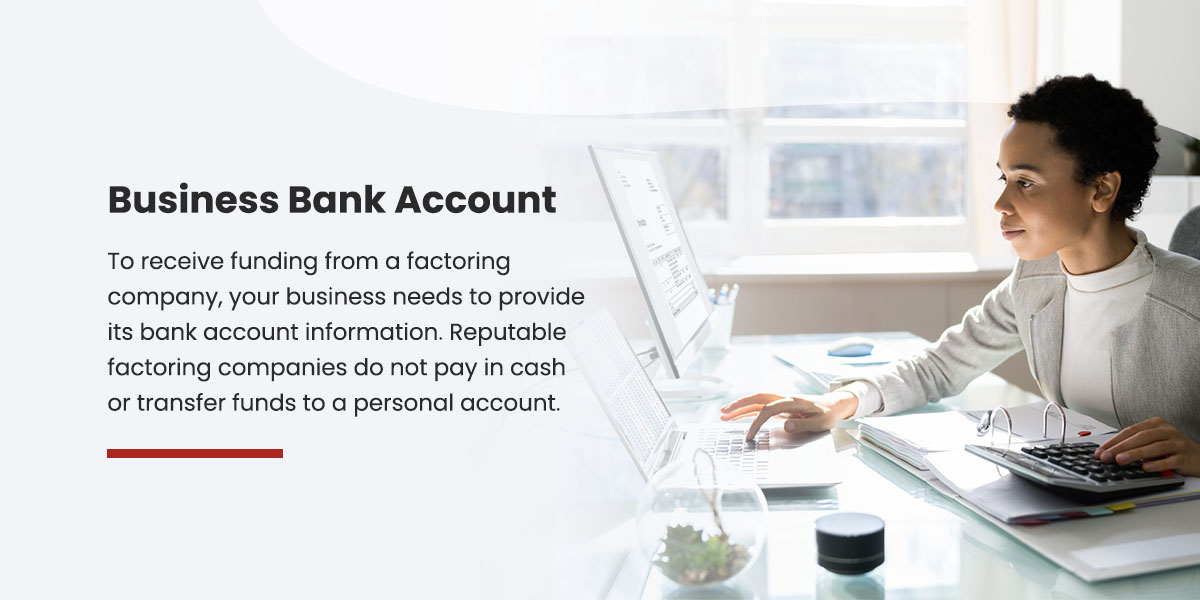
Your business needs cash flow to manage mission-critical tasks like ordering more stock and investing in marketing campaigns. Yet when customers are slow to pay their invoices, you can experience cash flow challenges that make it hard to sustain and grow your business.
In order to improve their cash flow management, many companies turn to invoice factoring. Invoice factoring allows your business to receive immediate cash for its outstanding invoices without applying for a loan or pursuing payments from customers. Factoring is a popular cash flow management solution, with the global volume of factoring at an all-time high.
Before a factoring company agrees to work with your business, you must meet specific factoring requirements.
Your business may need to meet several factoring requirements to partner with a particular factoring company. Be aware that factoring companies may have different document requirements and application processes. Understanding how to qualify for factoring can help your business prepare for entering a factoring agreement and solve its cash flow needs.
When considering what is needed to factor invoices, the most obvious requirement is unpaid invoices. In the invoice factoring process, a business sells outstanding invoices to a third-party factoring company. The factoring company, also called a factor, pays a significant portion of the slow-paying invoices to provide the business with immediate financing. The factor is then responsible for pursuing invoice payment from the customer.
Factoring companies require businesses to have unpaid invoices before they sign a factoring contract. Some factors may require a minimum number of monthly invoices before they will work with your company or have a maximum limit.
Factoring companies are more concerned with the creditworthiness of your business’s customers than your company’s credit. Invoice factoring relies on the creditworthiness of your business’s customers because they are the ones who must ultimately pay their invoices. While your business must pay the factor’s commissions and fees, your company poses less of a risk to the factor than your slow-paying customers.
Having at least some creditworthy customers makes your business an excellent candidate for invoice factoring, as the factoring company may be more willing to sign an agreement. This requirement also means factoring could be more feasible for your company than taking out a business loan that requires a particular credit score.
Factoring companies also require a factoring application before entering a factoring relationship with your company. The information you provide in the factoring application helps the factor determine whether it wants to work with your company and what rates it will charge you.
When filling out a factoring application, your company typically provides the factor with information about your business, its customers and the invoices it needs factoring. Here is a breakdown of what to expect from a factoring application:
Another critical document needed for invoice factoring is an accounts receivable aging report. This report provides a breakdown of your customers’ current unpaid invoices and details how long they have been outstanding.
Most companies organize an accounts receivable aging report by the customer and create columns according to the date ranges of unpaid invoices. This report also shows the total invoices that are due and the total that is past due.
The information in an accounts receivable aging report is crucial for a factoring company to have on hand, as it tells them which invoices represent the greatest risk. Factors also use accounts receivables aging reports to identify invoice due dates.

If your company is interested in invoice factoring, it likely has immediate funding needs. When they purchase your outstanding invoices, factoring companies may pay between 70% and 90% of your total invoice amount, which your business can use to meet its liquidity needs.
To receive funding from a factoring company, your business needs to provide its bank account information. Reputable factoring companies do not pay in cash or transfer funds to a personal account.
You will need to provide a potential factor with your business account and routing number. If your business has multiple bank accounts, choose the one that will be easiest to track.
Most factoring companies operating in the United States only work with fellow American-incorporated businesses. Early in the application process, the factoring company may request legal documentation that your company is legitimate. To prove your business is incorporated and legal, provide the factor with a copy of your articles of incorporation.
Your business’s articles of incorporation provide critical information about your company’s creation and document its identifying information, such as its name and address. The articles of incorporation also provide more detail about your company’s industry, as some factors only work with businesses in specific industries like construction or health care.
Another critical factoring requirement is your business’s tax identification number, also called an employer identification number. This number is your company’s unique tax identifier and verifies its business identity.
A factoring company will want to see your business tax ID number for a couple of reasons. First, your company tax ID ensures your business is legitimate. Factors can also use a company’s tax ID to verify that it pays its taxes on time.
Providing your business’s tax ID helps prove to a factoring company your business is trustworthy and makes them more likely to work with you.
Factoring companies may ask you to provide a form of personal identification during the application process. This document could be a passport, driver’s license or social security card. Factors request personal identification to ensure you are legitimate, which gives them more confidence in sending funds to your business.
The final factoring requirement is payment for the factoring company’s fees and commissions. Some factoring companies withhold fees from the initial amount they pay for your outstanding invoices. Others withhold fees and commissions from the remaining invoice amount after the customer has paid.
When choosing a factoring company, the commissions and fees the factor charges can be a significant consideration. Certain factoring companies have monthly pricing structures, while others require payment for an entire year. A more adaptable payment plan could give your company greater flexibility if it decides to go with another factoring company.
As your business prepares to sign a factoring agreement with a factoring company, it should ensure it has all the requirements to factor invoices. You may have some documents requiered for factoring on hand, such as your business’s tax ID and a copy of its articles of incorporation. Other factoring documents, like a factoring application, must come from the factoring company. Gathering these documents shows your business is qualified for factoring services.
At FactorFox, we offer invoice factoring services for companies in various industries. Our highly efficient team has the expertise and fast turnaround times to improve your business’s cash flow when you need it most. We also provide competitive pricing, advanced customer support and customized solutions to meet your company’s unique needs. To learn more about our invoice factoring services, contact FactorFox today.